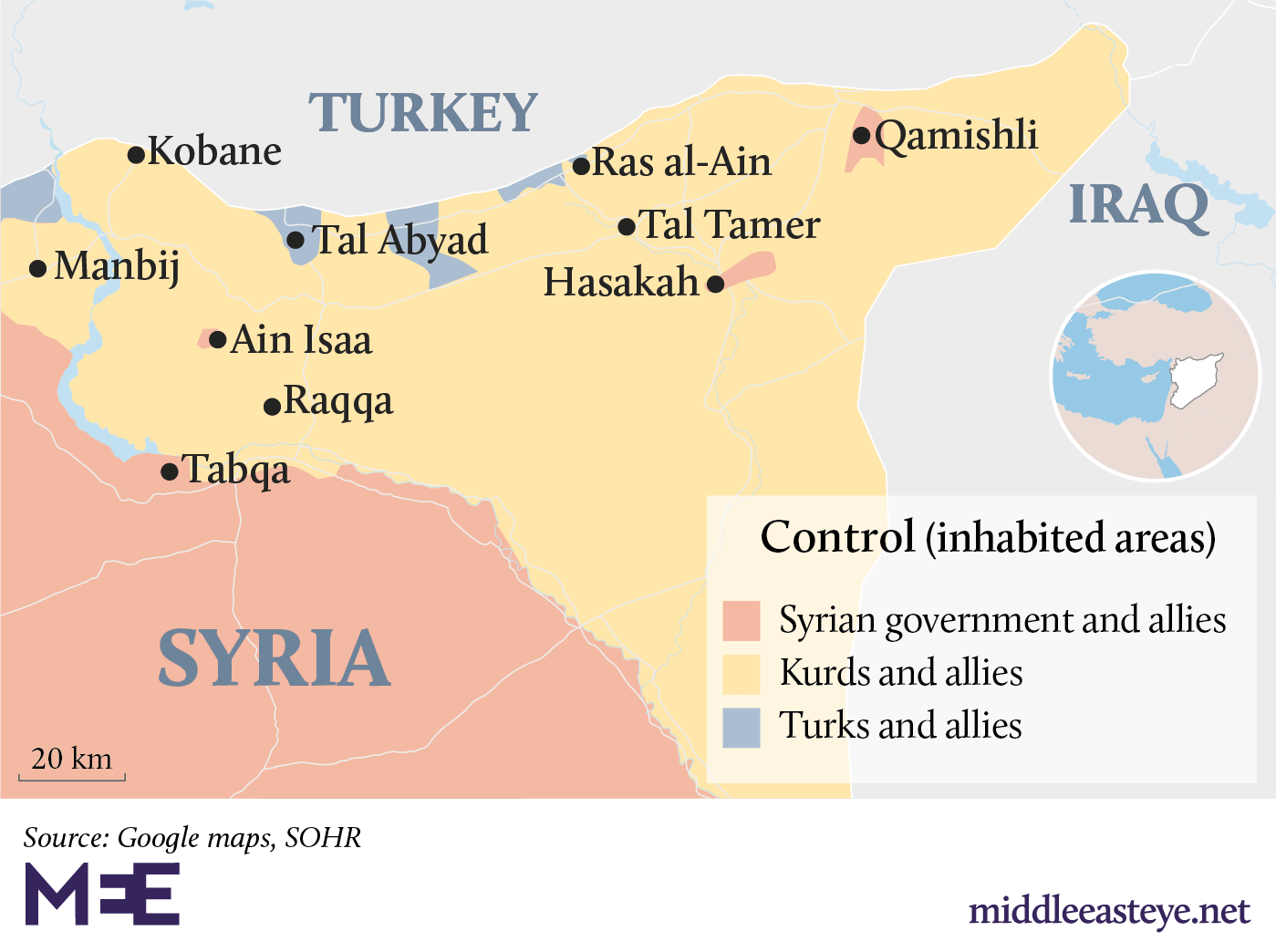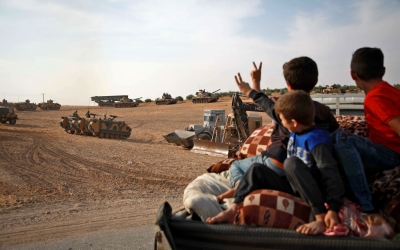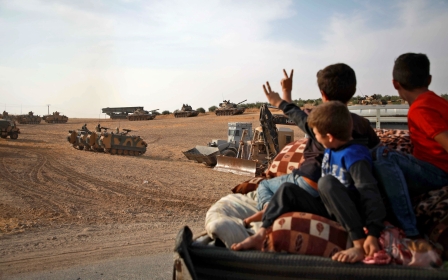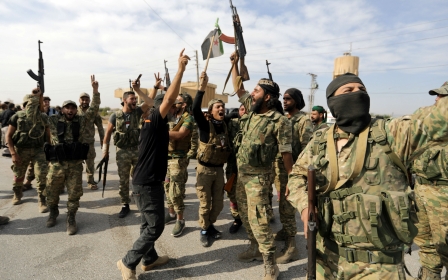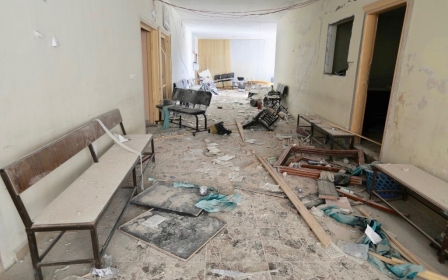Kurdish-led fighters battle pro-Turkish forces for control of key border town
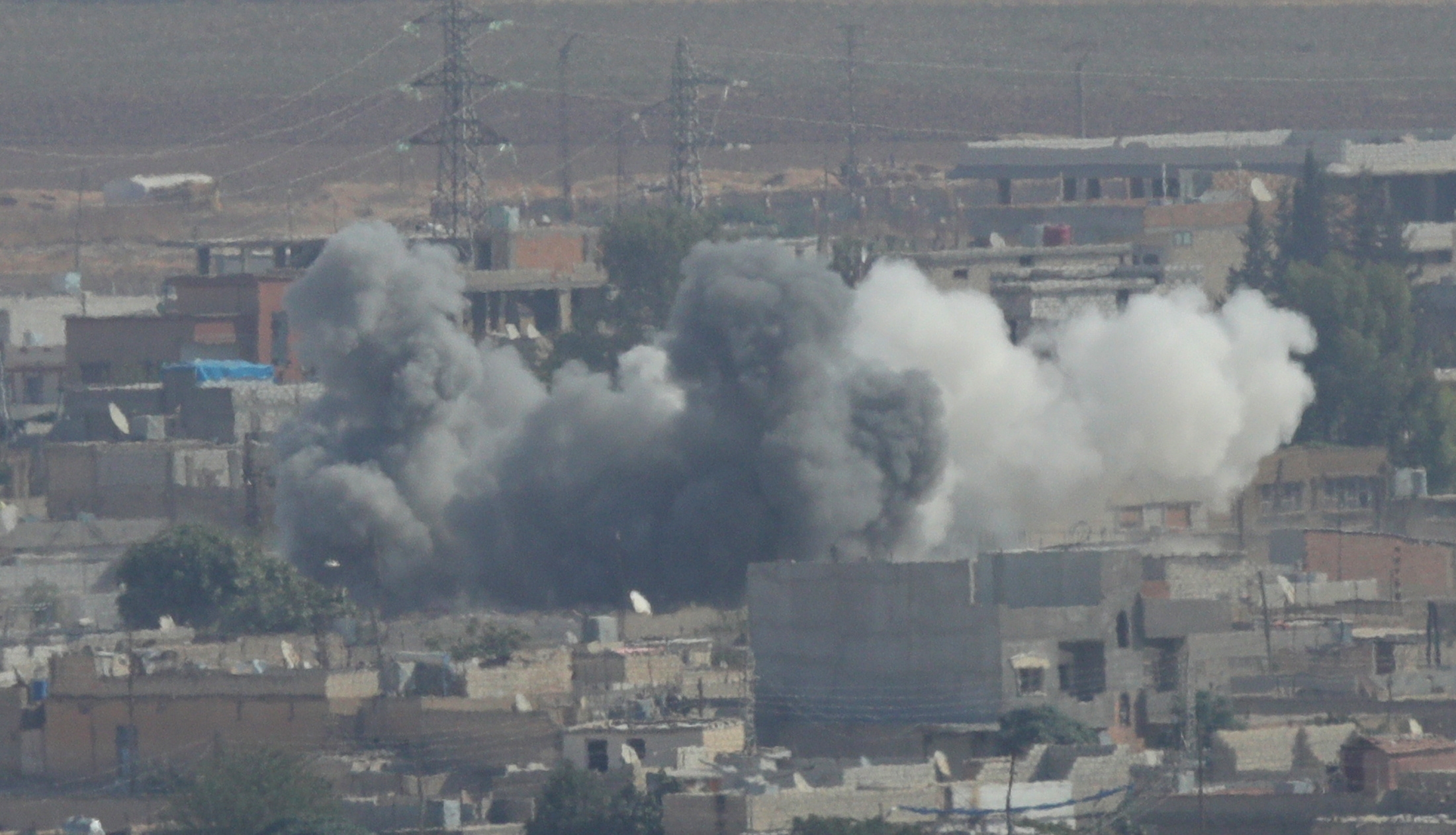
Kurdish-led forces have pushed back against an offensive by Turkey and its Syrian rebel proxies in the town of Ras al-Ain in northern Syria, an activist group said on Tuesday.
The Syrian Democratic Forces (SDF) militia "launched a major counter-attack overnight against Turkish forces and their Syrian proxies near Ras al-Ain," the Syrian Observatory for Human Rights said.
The Britain-based group, which relies on a network of sources on the ground, said "fortifications, tunnel networks and a continuous supply of reinforcements" had enabled the SDF to hold off Turkish efforts to take the town.
An AFP correspondent in the area said clashes continued on Tuesday, despite repeated claims by Ankara in recent days that it had captured the area.
New MEE newsletter: Jerusalem Dispatch
Sign up to get the latest insights and analysis on Israel-Palestine, alongside Turkey Unpacked and other MEE newsletters
A statement released by the Rojava Information Centre said "attacks of the four groups of Turkish proxy forces" that targeted Ras al-Ain at 4am from the Turkish border had "been repelled".
"Now there is a clash in the village Aras, 20/25 km away from Tal Tamer," said the organisation, who have operatives on the ground.
The Turkish offensive has already killed 70 civilians and 135 SDF fighters since its launch on 9 October, according to the Observatory, with the number of pro-Turkish Syrian fighters slain standing at 120.
The United Nations says at least 160,000 people have fled their homes.
On Tuesday, a UN human rights spokesperson called on Turkey to investigate the alleged summary executions of a Kurdish politician and fighters by a Turkish-allied group and said that Ankara could be held responsible for suspected war crimes committed by proxy forces under its control.
Video posted on social media appeared to show Turkish-backed fighters executing three Kurdish captives on the highway between Hasaka and Manbij on 12 October, while the UN said it had received reports that Hevrin Khalaf, a Kurdish politician, was executed on the same highway by the same group on the same day.
"We urge Turkish authorities immediately to launch an impartial, transparent and independent investigation and to apprehend those responsible, some of whom should be easily identifiable from the video footage they themselves shared on social media," said the UN's Rupert Colville.
Battle for Manbij
Further west, Turkey's Syrian proxies battled Kurdish-led fighters around the city of Manbij overnight, the Observatory said.
The activist group said that pro-Ankara fighters were battling forces loyal to the Manbij Military Council, a governing body linked to the Kurdish administration in northeastern Syria.
Why is Turkey invading northeast Syria?
+ Show - HideWho is fighting who?
Democratic Union Party (PYD)/Peoples Protection Units (YPG)
Founded in 2003, the PYD and its military wing the YPG are the ideological sister group of the Kurdistan Workers Party (PKK), which has fought a decades-long conflict with Turkey.
Following the beginning of the Syrian civil war in 2011, the PYD managed to take control of much of the Syria's north in the security vacuum that followed.
The group claims to espouse an ideology called "democratic confederalism", based on the ideology of PKK founder and leader Abdullah Ocalan, who has been in prison in Turkey since 1999.
Turkey
Turkey has long viewed the growth of the PYD with deep concern, and a peace process between Turkey and the PKK collapsed in 2015 in part over the spread of the Syrian Kurds' influence.
Since then, Erdogan has repeated his determination that he would "never allow the establishment of a Kurdish state in northern Syria".
What does Turkey want in northern Syria?
Turkey fears that a pro-PKK entity on its southern border would inevitably become a launchpad for attacks on Turkey.
In addition, Turkey wants to expell Syrian refugees from Turkey and resettle them in a "safe zone" it plans to create in northern Syria.
Turkey has the largest refugee population in the world, and the presence of Syrians in the country has increasingly led to animosity from Turks who blame them for crime, unemployment and the dilution of Turkish culture.
What does the PYD want in northern Syria?
The PYD's long-stated aim has been the creation of a statelet on the basis of Ocalan's ideology, as well as protecting Kurdish rights.
The area controlled by the PYD, known as Rojava, has established autonomy with networks of local councils and forums that aim to promote decentralised democracy - though the group has been accused of enforcing a one-party rule in the region.
What does the US-led coalition want?
Donald Trump was elected on a platform of isolationism and has touted the defeat of IS as the sole reason for US involvement in Syria - now that has largely taken place, Trump has argued the United States has no need to remain.
The biggest fear for the US and its allies is that Turkey's takeover of PYD-controlled areas could see the release of some of the 15,000 IS fighters previously captured by the Kurds and their allies.
What does the Syrian government (and its allies) want?
The Syrian government, as well as its close allies Iran and Russia, are happy about the US' decision to withdraw from the north, but have expressed concern about the violation of Syria's sovereignty by Turkey.
Syrian President Bashar al-Assad hopes that, when faced with the threat from Turkey, the PYD will throw their lot in with him in order to avoid total defeat.
Assad has repeatedly said he aims to regain control of all of Syria, and if the PYD was to ally with him formally, it would bring the largest area hitherto out of his control back under Damascus' influence.
This came after the Syrian government said it had dispatched troops to the city as part of an agreement with the Kurds announced on Sunday to contain Ankara's advance. A US military spokesperson confirmed on Tuesday that all of its forces had left the city.
Turkish President Recep Tayyip Erdogan has said he expects Kurdish forces to withdraw from Manbij, which lies some 30km south of the Turkish border.
Turkey accuses the SDF of being an extension of the Kurdistan Workers' Party (PKK), a group that has been at war with the Turkish state for decades.
Ankara says it wants to create a 35km wide buffer zone along the border to keep the group at arm's length and provide a resettlement area for some of the 3.6 million Syrian refugees currently on its soil.
Turkey's offensive was launched last week, after Washington announced it would pull its troops from northeast Syria, leaving its erstwhile partner the SDF to face the assault.
The United States said it was withdrawing all of its 1,000 troops in the region, keeping only a residual contingent of about 150 troops in the south at the Al-Tanf base near the Syrian border with Jordan and Iraq.
On Tuesday, Russia's envoy for Syria revealed that the deal between the Syrian government and the Kurds for the Syrian army to return to the northeast of the country was brokered in meetings between officials at the Russian-controlled Hmeimim airbase and other places.
Speaking to reporters in Abu Dhabi during a trip to the United Arab Emirates by Russian President Vladimir Putin, Alexander Lavrentiev also condemned the Turkish incursion into the country as "unacceptable", and said Ankara had not discussed the operation with Moscow in advance.
"The security of the Turkish-Syrian border must be ensured by the deployment of Syrian government troops along its entire length," said Lavrentiev.
"That's why we never spoke in favour or supported the idea of Turkish units (being deployed there), let alone the armed Syrian opposition."
Photos on Tuesday showed military vehicles near Manbij flying both Syrian and Russian flags.
Islamic State escape fears
The Turkish assault has raised fears in the international community that thousands of Islamic State group (IS) suspects being held by the SDF could escape.
European governments have been reluctant to repatriate suspected foreign fighters, and many suspects have been transferred to Iraq to face trial instead.
However, Human Rights Watch warned European countries on Tuesday against seeking such a transfer in the wake of Turkey's assault.
"Given Iraq's record of unfair trials, European states should not promote efforts to have their nationals transferred there for prosecution," HRW's Iraq researcher Belkis Wille said.
Any government supporting such a move "without taking measures to remove the risk of torture, sham trials and execution risks contributing to serious abuses," she said.
Wille said her organisation's monitoring showed that trials in Iraq were "inherently unfair and replete with due process violations".
She urged Britain, Denmark, France, Germany and other countries to seek their nationals' repatriation instead.
Writing in the Wall Street Journal on Tuesday, Erdogan vowed that IS suspects would not be allowed to escape Syria.
"We will ensure that no ISIS fighters leave northeastern Syria," Erdogan wrote in an editorial, using an alternative acronym for IS.
But he added that he believed western countries were hypocritical to worry that Turkey's operation against the Kurds risked a mass escape of militants.
"The same countries that lecture Turkey on the virtues of combating ISIS today, failed to stem the influx of foreign terrorist fighters in 2014 and 2015."
Middle East Eye delivers independent and unrivalled coverage and analysis of the Middle East, North Africa and beyond. To learn more about republishing this content and the associated fees, please fill out this form. More about MEE can be found here.


